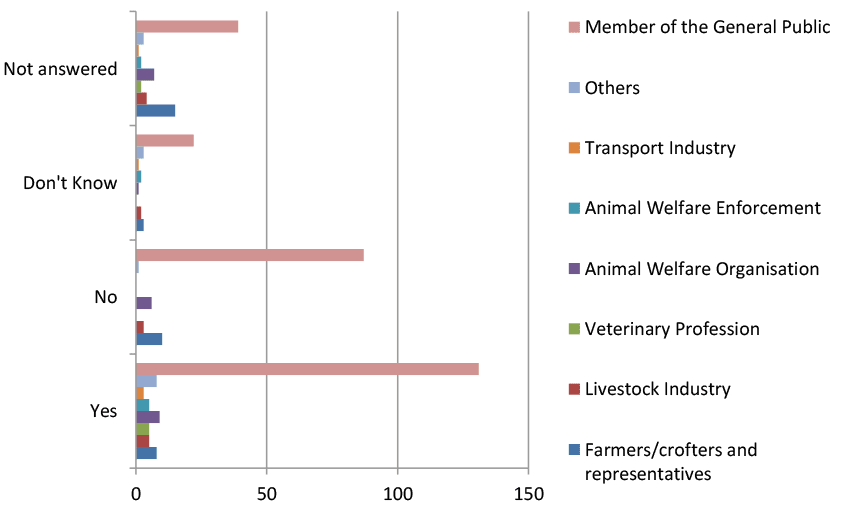Welfare of animals during transport - consultation: summary report
Analysis of the responses received to the full public consultation, between 4 December 2020 to 26 February 2021, of the Farm Animal Welfare Committee's opinion on the welfare of animals during transport.
Question 2
Do you agree that prior permission should be obtained from the relevant UK authority for some journeys exporting live animals and permission should only be granted if the reasons for not undertaking a shorter alternative journey are justified? Please provide any further relevant information.
The Scottish Government considers that FAWC’s recommendations provide a strong and credible foundation for considering future reforms. We agree with FAWC that, other things being equal, animals should only be transported when necessary, journey times should be minimised, animals should be slaughtered at the nearest suitable abattoir where possible and the most welfare considerate route should be chosen.
We agree with the principle that prior permission should be obtained from the relevant UK authority for some journeys; and that permission should only be granted if the reasons for not undertaking a shorter alternative journey are justified, and that sufficient reassurance should be provided about how animals being transported are being sufficiently protected. However, future arrangements need to recognise the particular geographical constraints that apply in remote areas.
We take note of FAWC’s recommendation on reviewing abattoir location and the proximity of abattoirs animal populations and in particular the impact this may have on end of life animals. We will also consider how government policy and retailers might better enable regional supply chains and support essential infrastructure like abattoirs.
We agree that further research regarding mobile slaughterhouses would be welcome, noting that government research funding is subject to the consideration of other research priorities and that this research could also be funded by industry.

Of the 315 responses to this question, 55.2% considered that prior permission for some journeys exporting live animals should only be granted where these could be justified. 34.0% did not consider that appropriate and 10.8% did not express a view.
In addition to considering merit in obtaining prior permission for some export journeys a large number of respondents also “urge for live export for fattening and slaughter to be phased out” (Sustainable Food Trust). Other respondents noted that “permission for such journeys should not become an ‘accepted’ journey going forward” (unnamed organisation). Other respondents suggested that the Scottish Government “needs to publish the standards and definitions of the conditions and situations that would not be accepted” (Four Paws).
A number of respondents agreed with the Scottish Government’s view on animals being slaughtered at the nearest suitable abattoir where possible. However, a range of views were expressed from the current number of licensed Scottish slaughterhouses as “an indication that there is sufficient facility in Scotland to slaughter animals” (Trading Standards, Orkney Islands Council) to the distances involved in some journeys to slaughter owing to the location of slaughter facilities being “determined by the main buyers” (Scottish Animal Health & Welfare Panel).
Scotland’s Rural College supported the idea of “local and mobile abattoirs to reduce journey times”. On the other hand, the Scottish Animal Health & Welfare Panel commented that “mobile abattoirs have been examined and rejected so many times during the last 30 years” and Aberdeenshire Council considered them as “suitable for some niche products but they are not economically viable at scale”.
There were also differing views associated with the export of breeding animals. In responses from the equine sector some considered that journeys exporting live horses for competition, sale or breeding were not considered to need prior permission. However, other respondents considered that “exporting animals ... for breeding should be exceptional and require prior permission” (Nourish Scotland) although that comment might have been directed at livestock only in the context of the wider response. Compassion in World Farming agreed with a requirement for “prior permission for essential exports, for example of breeding animals” but that “journeys for slaughter or ... fattening should never be regarded as essential”.
Some respondents from the livestock industry and the farming sector considered that banning live exports would, given a “significant decrease in the number of abattoirs in GB in the past number of years” lead to “increased pressure on the current operating meat processors” (unnamed organisation).
Contact
There is a problem
Thanks for your feedback